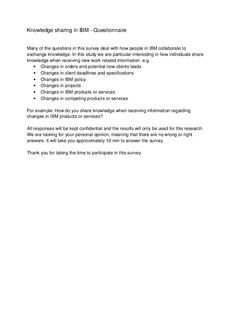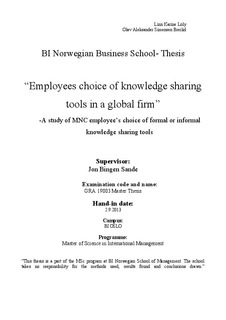| dc.description.abstract | Due to changes in the competitive landscape and increasing globalisation,
resources and the most effective use of these has become the key to competitive
advantage for most multinational firms. As employees are in the possession of
unique knowledge and expertise, employees have become an important resource
for firms, and thus efficient transfer of knowledge to other part of the
organisation, has become vital for business survival (Lin and Joe 2012;
Karkoulian and Mahseredjian 2012). Knowledge sharing is an emerging and
increasingly popular theme within in the academic literature, where research has
focused on the different impacts on employee’s willingness to share knowledge
(Argote et al. 2003). However, little existing research has focused on the impacts
on employees choice of knowledge sharing tools, thus this thesis aims to fill this
gap in literature, by examining how established and emerging impacts on the
willingness to share knowledge, namely intrinsic motivation, introjected
motivation, external motivation, network centrality, intra-firm competition and the
use of organisational rewards, impacts employees choice of formal or informal
knowledge sharing tools in a local and global context of multinational companies.
In addition the thesis aims to examine how the use of one type of knowledge
sharing tool impacts the use of the other, meaning whether they substitute or
complement each other.
The research was conducted in the Norwegian subsidiary of the multinational ITcompany
IBM, with respondents who worked on both local and global teams. Out
of 650 possible respondents, we received 154 responses.
The results revealed that contrary to our believes, motivation does not have a
significant impact on employee’s choice of knowledge sharing tools, with the
exception of external motivation, which was slightly significant for the use of
informal knowledge sharing tools. The results also showed that the use of rewards
had no impact on the choice of knowledge sharing tools. Intra-firm competition
had a positive correlation with the use of formal knowledge sharing tools;
however the level of employee’s network centrality had the highest effect on both
the choice of formal and informal knowledge sharing tools. Additionally, the
results showed that the two types of knowledge sharing tools complement each
other, rather than having a substitution effect. | no_NO |

